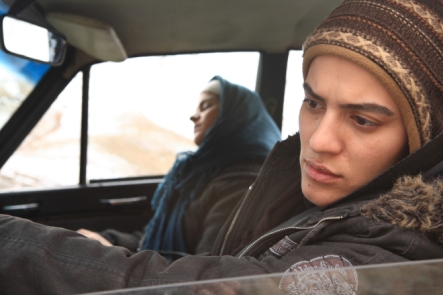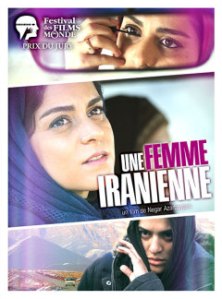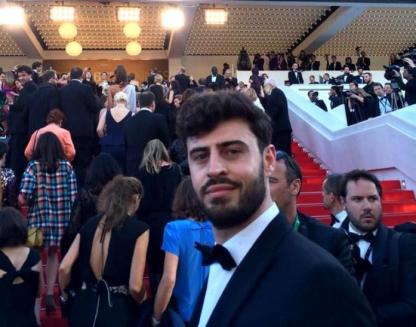Facing Mirrors (Aynehaye Rooberoo, 2011) is a very beautiful Iranian movie made by female director Negar Azarbayjani. Set in contemporary Iran, it tells the story of a « traditional » mother and wife who finds herself becoming a taxi driver to pay off the debt that sent her husband to prison, and becoming friends with Eddie, a trans boy desperately waiting for his passport allowing him to leave Iran.
Facing Mirrors toured in several LGBT French film festivals, winning in 2012 the Grand Prix of the Chéries-Chéris festival, and is being distributed by a non-profit organization called « The Film Colleborative ».
Which is how I came to see this film, in 2013 at the Face à Face festival in Saint-Étienne (France).
During the movie, I was taken aback several times with pronouns and gendering problems in the French subtitles. I was really looking forward to watch this movie but when it ended I remember thinking that these mistakes kind of ruined it for me.
So I decided to enquire about how these subtitles were made in the first place. I learned that a film festival from Provence hired a (non-LGBT) translation firm to do the job. So, after being given the translator’s e-mail address, I wrote to her in a very diplomatic fashion (yes, I do know how to be diplomatic at times) to tell her that given the context of the movie translating an English neutral form into a French feminine does not really work. E.g. when Eddie tells Rana « I’m a transsexual » (which is an important moment in the movie), it’s just simply not appropriate for the subtitles to read « Je suis une transsexuelle » (« I am a transsexual woman »).
As I expected, the translator didn’t receive my remarks very well, meaning that she politely but coldly disregarded them (after all, who was I to complain about her work?).
(page 8/17 : http://www.thefilmcollaborative.org/_dialoguelists/FACINGMIRRORS_Dialogue_List_42012.pdf)
I was a bit irritated, though not surprised – given that she was not an LGBT person and obviously didn’t bother to do research before doing her job. After all, that’s what most journalists do – or rather, don’t do- when they write about trans folks.
Nobody seems to have thought about this question within LGBT+ festivals. It’s a wonder that we are still surprised by this lack of concern from LGB« T » festivals who manage to get confused between MtF and FtM in their programs.
http://lgbt.zefestival.fr/index.php/festival-2015/festival-2013/long-metrages/item/facing-mirrors
I’m still upset about this. This is a good movie and the translation job not only warps the very meaning of it but also renders its main theme invisible, for reasons that are unfathomable to me.
The movie will be released nationally in France on May 13th, distributed by Outplay, said by the Écrans Mixtes festival (Lyon) on the 9th of March, 2015.
http://festival-em.org/avant-premi%C3%A8res-et-in%C3%A9dits/une-femme-iranienne/
But here’s the thing, though. The movie title was changed to « An iranian woman ».
Why ? Nobody knows. I tried asking Outplay (I was not super-nice while doing it, but I didn’t insult them either) through their Facebook page, their website, and ultimately by contacting Thibault Fougères, the head of the organization. He is also the co-founder and programmer for the Marais Film Festival, hardly an LGBT festival at that, but rather a neighborhood film festival, see http://yagg.com/2014/09/10/le-marais-film-festival-un-nouveau-rendez-vous-parisien-pour-le-cinema-lgbt/ )
About a week ago I finally got an answer back, saying that he didn’t have time, because he was on going to the cinema. (I hope he got out of there though, ’cause it’s not really healthy to eat only popcorn for a week, but whatever.)
I also have some questions about Outplay. How is it that a distributor, which broadcasts such excellent movies as Something Must Break, still has their website categorized into « for boys » and « for girls » ? Talk about binary. Sometimes I wonder if the directors are aware of this or had been asked beforehand, but who really knows. Maybe I’m a cinema extremist.
BUT WHY IS IT SO IMPORTANT ?
I’ll now try to explain some things that seem quite obvious to me (although I am, as you can probably tell, quite irritated about it).
Changing the title from Facing Mirrors, a rather good translation from the original Iranian title, to An Iranian Woman, completely erases the trans masculine character in the movie. One can wonder if the Iranian Woman in the title is actually meant to be Rana (or at least that is my hope so), but focusing the movie on her character cuts Eddie out of the story, as if he means nothing. That would not correspond with the main theme of the movie, which in fact is not Rana’s life itself, but the bonds and friendship which develops between the two characters and their shared journey, brilliatntly reflected by the original title.
Trans erasure is what’s happening here, and it is happening in the same way that transmaculine folks (Ft*, FtM) are usually discriminated against. Every day, we receive the message that we are a disposable identity, or that we do not exist at all, from our surroundings, from our loved ones, the media, the doctors, the administration, representatives, cis gays and lesbians. This might appear only as « small mistakes » in the eyes of others; mistakes about our names, our pronouns, vocabulary mistakes, stuff that gets forgotten or left out. But the truth is that erasure kills. That message is of the kind that gets under our skin day after day. It’s the kind of message that gets inside a trans child or adult to tell them that their identity will never be validated as important by others, that they must be crazy, that they must stop being who they are in this society or even in this life.
There are very few movies with transmasculine people as main characters. Boys Don’t Cry still gets classified as a lesbian movie on some LGBT websites, and I have a feeling that we are the only ones getting upset about it. I think it’s time to get harder on this, to stop being nice, and to get deeper into the « details » that pile up and make our lives a lot more diffivult. We need cis gays, lesbians and bi people to take the responsibility they have towards us if they want to continue to wear the « LGBT » label with pride.



